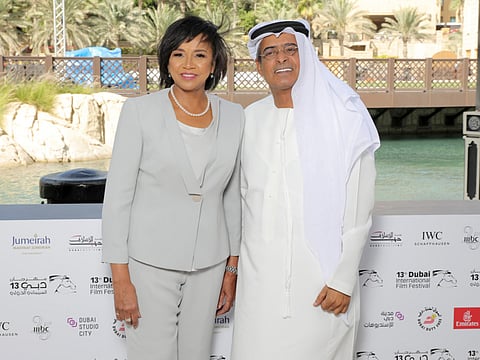UAE films now eligible for Oscar nomination
Emirati filmmakers told tabloid! what this means for them on Sunday morning

The UAE is now eligible to submit an entry into the Academy Awards as part of its foreign language category, announced Dubai International Film Festival on Sunday.
A selection committee that was approved this month can now put forward an entry for the 90th Academy Awards, which will take place on March 4, 2018 at the Dolby Theatre in Hollywood, California. Emirati director Abdullah Al Kaabi called this fantastic news.
“For us filmmakers from the UAE, it’s always been kind of hard working in this industry, because we don’t have an umbrella or institute that we can work under — a national institute for film,” said Al Kaabi, who last year won the Muhr Emirati Best Feature award for his film Only Men Go to the Grave.
“If you asked me a year ago, I would have told you I don’t know; I’ve always dreamed of an Oscar and I can be sure that one day I will be talking to you about it, but I didn’t know what the way to go to the Oscars was, since we didn’t really have a film institute for submission. Now that Diff is on-board, and we won the last Muhr Emirati film award, I think things are starting to look quite great and we can finally see a way to reach the Oscars,” he added.
The Academy defines a foreign language film as a feature-length motion picture produced outside of America with primarily non-English dialogue. It must be released in its home country before October 1, and must be publicly shown at a commercial theatre, for the profit of the producer and exhibitor, for at least seven consecutive days. Entries submitted by countries around the world must then be chosen, or rejected, as official nominees. No major UAE films have had a cinematic release in 2017, but The Worthy, Aeriels and Hajwalah released in 2016.
“In recent years films [in the region] began to improve in a major way, whether artistically, or through the stories they told,” said Hajwalah co-director Ibrahim Bin Mohamed. “Emirati films aren’t lacking anything, and I believe this is a great step to attempt to enter the Oscars. There are films, such as Ali Mostafa’s The Worthy and Zinzana by Majid Al Ansari, that bring together a commercial appeal and an artistic integrity. Those are ideal contenders for the Oscars, and I’m sure there are new, unreleased films that could compete, as well.”
Nayla Al Khaja, an Emirati director and the founder of The Scene Club, a members-only initiative that champions independent cinema, was happy about the potential inclusion of the UAE at the Oscars, but said there is still more work to be done locally.
“I think for us to reach that stage, there’s another exercise that needs to be done, which in my opinion is more and more important, and that is, for the government to finally start a film grant, which a lot of countries have,” said Al Khaja.
“That will really help Emiratis produce quality films with a professional budget. Because right now it’s really a struggle for very talented filmmakers to get their films financed, and I think once we start snowballing that effect, you’ll get more content produced per year, which means the chances of actually getting the Oscar will be much higher. Having Emirati films qualify for that is absolutely fantastic,” she added.
The selection committee in the UAE is 13 members strong, comprising of Diff chairman Abdul Hamid Juma, Abu Dhabi Tourism & Culture chairman Mohammad Khalifa Al Mubarak, film critic Antonia Carver, director-producer Abdullah Hasan Ahmad, poet and scriptwriter Ahmad Salmeen, head of narrative film and television at Abu Dhabi production house Image Nation Ben Ross, co-founder and managing director of Cinema Akil Butheina Hamed Kazim, managing partner of Middle East distributor Front Row Filmed Entertainment Gianluca Chakra, artist and culture writer Hind Mezaina, MBC television executive and festival director of Ana Cinema Lin aMatta, filmmaker Mohammed Al Otaiba, film critic Mohammed Rouda and composer Taha Al Ajami.
“It’s encouragement for all UAE filmmakers that our stories can go a long way in today’s world. The UAE film industry has come on leaps and bounds in the last 10 years and the future looks very promising with more compelling films being produced year on year, and finding acclaim at festivals around the world and securing theatrical releases,” said Diff chairman Abdul Hamid Juma in a press release.
Ahmad Zain, who last year released the dramedy Lisa as part of Diff’s Muhr Emirati, was optimistic about the impact this would have on further productivity in the industry.
“It will absolutely help to improve cinema here and filmmakers will work even harder now that there’s the possibility of the Oscars accepting their films. There will be more and more movies that are worthy of nomination,” he said.
Sign up for the Daily Briefing
Get the latest news and updates straight to your inbox

